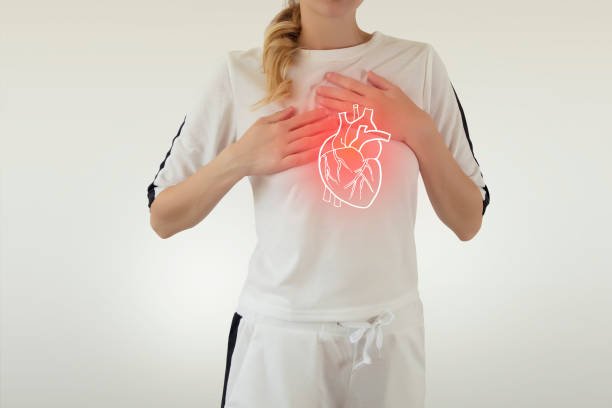
3 Major Types of Heart Inflammation! Read the Complete Symptoms, Examination and Treatment of Heart Inflammation
Redness, swelling, heat, pain, itching, etc. are all common inflammatory reactions in the human body. In fact, not only the body, but also the heart will be inflamed. When the heart is inflamed, it is easy to cause bacterial infection, which in turn can lead to more serious heart disease. Seemingly small inflammation and Viral infection can cause symptoms that are hard to ignore
When the heart is inflamed, can we make a preliminary diagnosis based on the following symptoms? Can heart inflammation cause complications if left untreated? How to treat and prevent it properly? Let this article take you through the heart inflammation that you don’t know about.
What is heart inflammation?
Heart inflammation is a symptom of heart tissue inflammation caused by bacterial or viral infection or autoimmune disease. It can be roughly divided into endocarditis, myocarditis, and pericarditis.
- Endocarditis:
This is the innermost layer of the heart, which is also the outer wall of the ventricles and atria. Endocarditis is often caused by a bacterial infection and occurs more commonly in patients with congenital heart disease or in patients who have undergone cardiac surgery with implants. When the heart tissue is not smooth, it is easy for bacteria to grow, forming “vegetations” and causing other complications. Once endocarditis occurs, it should be treated as soon as possible to prevent bacteria from directly invading the heart chambers or valves and causing damage. - Myocarditis:
The myocardium is the heart tissue located between the endocardium and pericardium. Myocarditis is special, and viruses are the main cause. For example, Coxsackievirus (a type of enterovirus), Adenovirus, Hepatitis C virus, etc. However, it may also be caused by bacterial or parasitic infection. It is a relatively rare symptom. - Pericarditis:
The outer layer of tissue covering the heart muscle. Similar to myocarditis, coxsackievirus can cause pericarditis, so sometimes pericarditis and myocarditis may occur together. In addition, autoimmune diseases such as lupus erythematosus and rheumatoid arthritis may also cause pericarditis.
What are the symptoms of heart inflammation?
Symptoms of different types of heart inflammation sometimes have similarities; for example, patients with coronary heart disease and arrhythmia may both experience chest pain or difficulty breathing. When you find that you have the following symptoms, you should seek medical examination as soon as possible
- Chest pain or feeling of pressure
- Difficulty breathing, rapid breathing
- Palpitations
- Dizziness
- Syncope
- Tired
- Joint and muscle pain
- Swelling of lower limbs and abdomen
- Fever
- Red tender spots under the nails
- Purple or red spots appear on the skin, mouth, and whites of the eyes.
- Hematuria

Inflammation of the heart may cause sudden death or stroke!
Complications of heart inflammation depend on the type of infection. For example, bacterial growths in patients with endocarditis may flake off as the blood washes away, and the flakes may travel along the bloodstream and eventually become lodged in smaller blood vessels. When it gets stuck in the lungs, it may cause pulmonary embolism; if it gets stuck in the brain, it may cause a stroke.
If the infected heart is not properly treated, it may damage other heart tissues or affect normal function, such as arrhythmias, heart failure, and even sudden cardiac death.
5 major tests to diagnose heart inflammation
There are various types of heart symptoms. In order to determine which symptom it is, doctors will first narrow down the scope of the disease through consultation and physical examination, and then determine the type of disease through various cardiac examinations.
When a patient is diagnosed with possible myocarditis, blood is often drawn to check cardiac enzymes, such as troponin, creatine kinase and other values to understand the degree of myocardial damage; “PCR testing” or other virus tests are also used Culture tests confirm whether there is viral RNA or DNA in the patient’s body.
If infective endocarditis or pericarditis is suspected, most blood bacterial cultures will be used to confirm whether there are bacteria in the patient’s blood. In addition, observing the shape, structure, and heart rate of the heart through the following five major methods is also one of the key examination items commonly used by doctors to help identify the type of disease.
- Electrocardiography
- Echocardiography
- CT scan
- Chest X-ray
- Cardiac catheterization
How to treat heart inflammation if diagnosed?
Treatment after cardiac inflammation is diagnosed can be divided into “treating the disease itself” or “improving symptoms.”
Take infective endocarditis as an example. When you suffer from bacterial infection, most people think that it is treated with antibiotics. However, endocarditis may also damage the patient’s heart valves. If the condition is severe, doctors may need to perform surgery to repair the valves or replace them with artificial valves.
In addition, if heart infection causes arrhythmia or heart failure, doctors will also need to use antiarrhythmic and heart failure drugs. The following are the main treatment drugs used according to the three types of heart inflammation:
- Endocarditis:
Intravenous antibiotics are the mainstay of treatment. Depending on the patient’s valve damage or other complications, subsequent treatment options will be determined. - Myocarditis:
It is mostly caused by viral infection. Therefore, the treatment is mainly supportive therapy, which can alleviate the various symptoms caused by myocarditis and allow the patient’s body to gradually recover. - Pericarditis:
Treatment with corticosteroids and colchicine non-steroidal anti-inflammatory analgesics (NSAIDs) can be considered. If the patient develops pericardial effusion, surgical drainage is required to drain the fluid.
How to avoid heart inflammation?
If you want to avoid heart inflammation, you might as well reduce the risk of heart infection through the following 4 ways:
- Good hygiene habits:
wash your hands frequently, wear a mask, and maintain dental health. These methods can make you less likely to catch colds, get bacterial infections, or allow bacteria to enter the bloodstream due to dental disease. - Healthy lifestyle:
A balanced and varied diet and more exercise can improve your immunity and reduce the risk of heart infection. - Beware of ticks:
Tick bites carrying the bacterium Borrelia burgdorferi may cause Lyme disease, which can cause symptoms of myocarditis. - Vaccination:
For example, influenza vaccination can reduce the risk of acute myocarditis or other heart infections caused by viruses.












